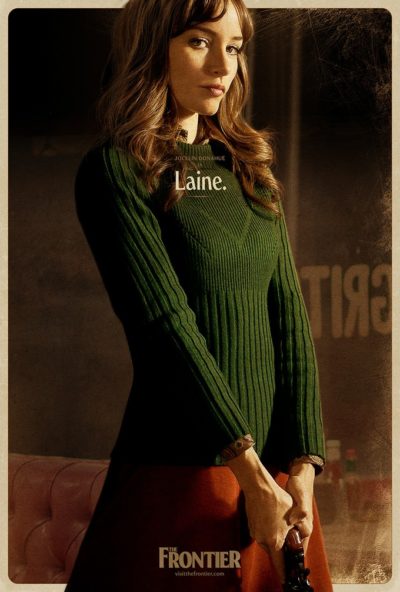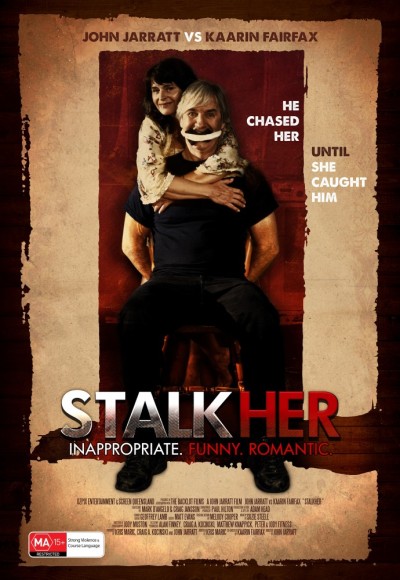★★
“A cash and grab story.”
 Laine (Donahue) is on the run. From what isn’t immediately clear, but it seems to be something to do with the death of an oil executive. Whatever the reason, she’s staying off the highways and keeping to the back roads. One morning, she wakes up beside The Frontier, a diner/motel owned and operated by Luanne (Lynch), who offers Laine employment, in return for board and lodging. Laine initially rejects the offer, then discovers some other guests are apparently there in the aftermath of an armoured car robbery, which netted them two million dollars. Laine therefore decides it’s in her best interests to stick around, and begins a game of chess with the perpetrators, to see if she can end up walking away with their ill-gotten gains.
Laine (Donahue) is on the run. From what isn’t immediately clear, but it seems to be something to do with the death of an oil executive. Whatever the reason, she’s staying off the highways and keeping to the back roads. One morning, she wakes up beside The Frontier, a diner/motel owned and operated by Luanne (Lynch), who offers Laine employment, in return for board and lodging. Laine initially rejects the offer, then discovers some other guests are apparently there in the aftermath of an armoured car robbery, which netted them two million dollars. Laine therefore decides it’s in her best interests to stick around, and begins a game of chess with the perpetrators, to see if she can end up walking away with their ill-gotten gains.
Opening in a shot of Laine, lighting a cigarette with her blood-stained hands, the story then unfolds in flashback. The style seems deliberately vague in terms of era; some aspects of this seem right out of the seventies, while others appear to be throwbacks to an earlier, film noir approach. There are definitely elements of David Lynch here – not just in the original title, Thieves’ Highway, also from the dialogue and a sense of lurking evil beneath a thin surface layer of everyday normality. Maybe The Hateful 8, with a group of players of uncertain agenda, forced to interact? You could even claim some Lars Von Trier here, in the way that the movie almost entirely takes place in a single location, often feeling like an adaptation of a play – perhaps one where the buildings are defined entirely by chalk lines, drawn on the stage.
Unfortunately, most of this fails to be as interesting as the sources it’s trying to imitate. The script makes the mistake of thinking that a sheer quantity of duplicity and double-crosses, will somehow make up for there being no particular reason to give a damn about most of the characters. Their obvious lack of honesty, everyone holding the cards close to their chest, makes it hard for the audience to get on board with any of them – particularly Laine, who is clearly intended to be the audience’s focus. Though Donahue, overall, isn’t bad in the role. She delivers an interesting mix of steely determination and street wit that, if not likeable, is always watchable, offering an acceptable twist on the typical femme fatale.
The rest of the cast feel more like standard tropes from that genre: the gruff, brutish thug; the ditzy moll; the fake “gentleman”, and so on, things you’ve likely seen far too often before, and neither the script nor their portrayals do enough to make them come alive. Things meander along to the entirely expected, bloody conclusion promised by that opening shot, and it feels longer instead of shorter than its relatively brisk 88 minute running-time. While there’s some promise here, and signs of talent, it would be a large stretch to say either are fulfilled.
Dir: Oren Shai
Star: Jocelin Donahue, Kelly Lynch, Jim Beaver, Izabella Miko





 Two stars might actually be a bit generous, on an objective scale. But I confess to possessing a soft spot for low-budget films made with passion, even if the results fall short. The most obvious deficiency here is the location shooting. Outside of an opening scene with a few ramshackle houses, the entire film takes place in a forest. Seriously, the closest thereafter we get to seeing any other buildings, is two people leaning up against a fence… in the middle of the woods. Maybe they should have called it Calamity Jane: The Wilderness Years, and set viewer expectations appropriately.
Two stars might actually be a bit generous, on an objective scale. But I confess to possessing a soft spot for low-budget films made with passion, even if the results fall short. The most obvious deficiency here is the location shooting. Outside of an opening scene with a few ramshackle houses, the entire film takes place in a forest. Seriously, the closest thereafter we get to seeing any other buildings, is two people leaning up against a fence… in the middle of the woods. Maybe they should have called it Calamity Jane: The Wilderness Years, and set viewer expectations appropriately. It kinda works, mostly for the dynamics between the trio of leading ladies. At first, Cali’s approach seems sensible, arguably a legitimate way to make the best of a bad situation. However, a change in the scenario shifts things seismically, and even the toughest of her supporters would have to admit an unpleasant streak of psychopathy is opened in her make-up. Evil sometimes wears a pretty face, and Turshen reminded me more than a little of Denise Richards in Wild Things – manipulative and . Less successful, to the point of entire irrelevance, is the boyfriend who shows up and yells for a bit. I suspect, given the slight running time of 75 minutes, his presence may have been a late-added necessity in order to reach feature length.
It kinda works, mostly for the dynamics between the trio of leading ladies. At first, Cali’s approach seems sensible, arguably a legitimate way to make the best of a bad situation. However, a change in the scenario shifts things seismically, and even the toughest of her supporters would have to admit an unpleasant streak of psychopathy is opened in her make-up. Evil sometimes wears a pretty face, and Turshen reminded me more than a little of Denise Richards in Wild Things – manipulative and . Less successful, to the point of entire irrelevance, is the boyfriend who shows up and yells for a bit. I suspect, given the slight running time of 75 minutes, his presence may have been a late-added necessity in order to reach feature length. If you go in with expectations based on the poster, you are going to get two-thirds of the way into this and wonder if there was some mix-up. It’s only as the last act unfolds that the image makes sense – though it’s still somewhat of a misdirection. The main central character is actually Aram (Barreiro), a middle manager accountant stuck in a dull job, and an even less fulfilling marriage and family. He has a plan to break the monotony, which involves kidnapping a teenage girl, Anie (Vell), and Aram is plotting the crime with his trademark attention to detail.
If you go in with expectations based on the poster, you are going to get two-thirds of the way into this and wonder if there was some mix-up. It’s only as the last act unfolds that the image makes sense – though it’s still somewhat of a misdirection. The main central character is actually Aram (Barreiro), a middle manager accountant stuck in a dull job, and an even less fulfilling marriage and family. He has a plan to break the monotony, which involves kidnapping a teenage girl, Anie (Vell), and Aram is plotting the crime with his trademark attention to detail. Having used my entire quota of hyphens for this review in that tag-line, what do we have here? I could remember virtually nothing about the original, even though it was only a couple of years ago we reviewed it. Seems to have ended up with the same vaguely mediocre rating though. The problem here, however, is mostly one of pacing. After a brief flurry of impressive activity at the beginning, there’s not much happening on the action front for about an hour, and what takes its place falls short of adequate entertainment.
Having used my entire quota of hyphens for this review in that tag-line, what do we have here? I could remember virtually nothing about the original, even though it was only a couple of years ago we reviewed it. Seems to have ended up with the same vaguely mediocre rating though. The problem here, however, is mostly one of pacing. After a brief flurry of impressive activity at the beginning, there’s not much happening on the action front for about an hour, and what takes its place falls short of adequate entertainment.


 Since the death of their father, brother and sister Conrad and Anna (Riesgraf) have been each other’s companions. Virtually sole, in the latter’s case, as Anna suffers from severe agoraphobia, which means she hasn’t left the house for a decade. After Conrad dies of cancer, her only visitor is Meals on Wheels delivery guy, Dan (Culkin), who dreams of escaping town, but lacks the means. In a moment of empathy, Anna offers him a slab of cash: he declines, but after mentioning it in the wrong place, three criminals, led by J.P. (Kesy), decide to pay the house a visit. They’re expecting Anna to be at Conrad’s funeral, unaware of her condition. They are even more wrong about how helpless it makes her.
Since the death of their father, brother and sister Conrad and Anna (Riesgraf) have been each other’s companions. Virtually sole, in the latter’s case, as Anna suffers from severe agoraphobia, which means she hasn’t left the house for a decade. After Conrad dies of cancer, her only visitor is Meals on Wheels delivery guy, Dan (Culkin), who dreams of escaping town, but lacks the means. In a moment of empathy, Anna offers him a slab of cash: he declines, but after mentioning it in the wrong place, three criminals, led by J.P. (Kesy), decide to pay the house a visit. They’re expecting Anna to be at Conrad’s funeral, unaware of her condition. They are even more wrong about how helpless it makes her.